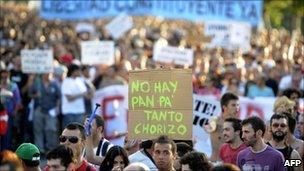Spain to create constitutional borrowing limit
- Published

Spain has seen a number of large protests against the government's austerity measures
Spain's government and opposition have agreed to pass a constitutional limit on public sector borrowing.
Last week, the French and German leaders called for all eurozone governments to introduce such a limit to help contain the euro debt crisis.
The move came as the Spanish parliament discussed further austerity designed to cut the deficit to 6% of economic output this year, from 9.2% in 2010.
The prime minister also attacked market fears over Spanish borrowing.
Borrowing costs
Spain's proposed constitutional amendment would require the government to maintain a balanced budget, and would put a cap on the total amount of debts it could run up.
"It represents a step toward strengthening confidence in the medium and long term stability in the Spanish economy," said Spain's Prime Minister, Jose Luis Rodriguez Zapatero.
Mr Zapatero said he had already discussed the proposed borrowing limit with opposition leader Mariano Rajoy, whose People's Party intends to back it.
Mr Rajoy told an extraordinary session of parliament: "I think it should have been done already, and things would gave gone better for us."
The constitutional amendment needs a 60% majority in both chambers of parliament, and can only pass with opposition support.
It is expected to be passed ahead of elections due on 20 November. Mr Rajoy's party currently enjoys a double-digit lead over the ruling Socialists in opinion polls.
The prime minister told parliament that the rise in Spain's borrowing costs in markets last month compared with Germany's was not justified.
Spain's economy was growing, despite the market volatility, but the turbulence threatened to exacerbate the country's economic crisis, he said.
Financial markets provided some relief on Tuesday, with the cost of borrowing at a three-month treasury bill auction falling to 1.357% at an annualised rate, from 1.899% previously.
Borrowing costs for Spain and other heavily indebted eurozone governments have fallen sharply in the past two weeks after the European Central Bank's decision to start buying up Spanish and Italian debts.
Expectations that interest rates will be kept low by the ECB in response to a slowdown in the eurozone economy have also helped.
Transaction tax
German Chancellor Angela Merkel and French President Nicolas Sarkozy last week called for all 17 eurozone governments to pass constitutional requirements by 2012 to balance their budgets as a "golden rule".
Meanwhile, the French and German finance ministers are meeting in Paris to flesh out agreements made between their respective leaders last week.
Francois Baroin of France and Wolfgang Schaeuble of Germany will prepare a joint proposal to be put to the other EU governments next month.
It will include details of a proposed tax on financial transactions that is likely to be opposed by European banks and stock exchanges.
The tax is intended to discourage speculation and stabilise markets. It is unclear as yet what the proceeds would be used for.
France and Germany also want to harmonise corporate tax rates between the two countries.